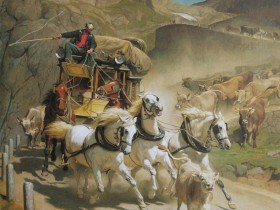
EPTA Council Meeting, November 7, Pilatus Mountain, Lucerne, Switzerland and EPTA Conference, November 8, Swiss Museum of Transport in Lucerne, Switzerland
This year's EPTA Conference will address different developments in future mobility from multiple perspectives. The conference aims to foster debate on shaping future mobility, encouraging parliamentarians, experts and stakeholders to discuss possible solutions as well as desirable and adverse outcomes.
Program and inscription and practical information
European citizens and economic actors need a transport system which provides them with seamless, high-quality door-to-door mobility. However, according to the European Commission, many towns and cities increasingly face problems caused by transport and traffic. One dominant problem is severe traffic congestion; its total cost in the EU is estimated at €80 billion annually.
The question of how to enhance mobility while at the same time reducing pollution, congestion and accidents is a common challenge to all major cities in Europe. A profound transformation in the transport system will be required in the coming decades. New developments like autonomous and connected driving, sharing economy, mobility pricing or mobility as a service are expected to shape the future of our mobility and revolutionise our transport systems.
Mobility present, future and past: The Swiss Museum of Transport has been collecting, looking after and exhibiting national cultural heritage in the areas of transport and mobility since 1959, such as the legendary Gotthard stagecoach illustrated above.
On the day before the EPTA Conference, the world's steepest Cog Railway will take the EPTA Directors to the top of Mount Pilatus, dragon's lair, home to giants and maybe uneasy grave to Pontius Pilate. A dragon rock supposedly fell from the sky in the year 1420 and was officially declared to have healing powers in 1509. Pilate might have been buried in a cavern there, a petrified man standing guard at its entrance but unable to prevent the Roman governor to emerge each Good Friday to wash his hands in the icy waters.
Recent Policy Briefs from EPTA members
-
Election turnout: Why do some people not vote? (POST)
-
Solar Power Grid integration. ITA Dossier No 75en (ITA)
-
Wildfire risks to UK landscapes (POST)
-
Strategies and instruments for improving the use of recycled materials - policy brief (TAB)
-
Strategies and instruments for improving the use of recycled materials (TAB)
-
What if the problem with cars was not their method of propulsion? (STOA)
-
What does good policy advice look like in times of crisis? (ITA Dossier No.74en, Mar. 2024) (ITA)

